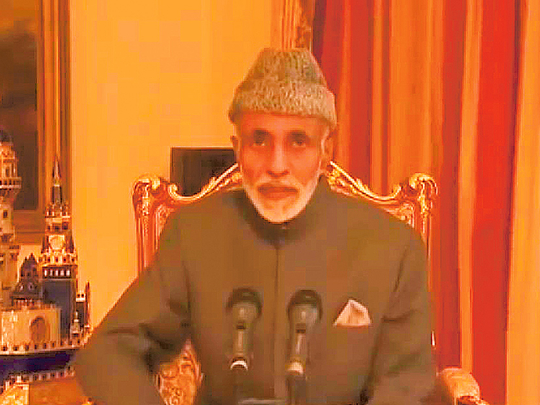
Dubai: The prolonged absence of Oman’s Sultan Qaboos Bin Saeed Al Saeed who has not returned since travelling overseas for medical tests six months ago for suspected cancer, has stirred fears over stability in his Gulf country.
The 74-year-old ruler holds the positions of prime minister, as well as holding the foreign affairs, finance, defence and interior portfolios.
But without children, or even brothers, he has no direct heir, and his absence is raising questions over who will succeed him.
The sultan, who has been on the throne for 44 years, went to Germany in July for medical tests, with one diplomat saying he suffers from colon cancer.
Since then, he has made only one appearance, in a brief video that was broadcast on national television on November 5.
In it, Sultan Qaboos spoke of what he called the “good results”, of his treatment, but added that his condition requires monitoring.
Speaking in Muscat, a Western diplomat said that “the sultan wanted to show that he remains in control of the country, even continuing to issue decrees from his place of residence abroad.”
When he took the reins of power, Oman was an isolated country living on the margins of the modern world with little or no infrastructure.
Omani analyst Ahmad Ali Al Mukhaini said Sultan Qaboos would be remembered as the man who transformed the sultanate into a modern state.
“His status will give legitimacy and credibility to future sultans,” Al Mukhaini said.
In the meantime, however, “the government is slow to make decisions”, because it is the first time that it has had to cope without the sultan, he added.
In 2011, the sultan amended the process for choosing his successor. He appointed five top officials to a council that would be involved in confirming the new sultan in case of any royal family dispute.
“But as he has not assigned prerogatives, nobody can make decisions in his place”, during his life, another diplomat said.
The diplomat said that posed problems amid an economic slowdown that is likely to worsen after the price of crude nearly halved since June.
The sultanate derives 79 per cent of its revenues from oil, of which it produces only about one million barrels per day.
The non-Organisation of the Petroleum Exporting Countries member has projected a budget deficit this year of $6.47 billion (Dh23 billion), representing eight per cent of GDP.
“Despite their reassurances that minimise the impact of falling oil revenues, Omani officials fear a slowdown in investments and, therefore, the suspension of major infrastructure projects,” the first diplomat said.
In 2008, Oman announced plans to build a port and shipyard in Duqm, designed to handle ultra-large crude carriers and compete with Dubai’s Jebel Ali free zone. But the project has never moved beyond its first phase.
Aware of the consequences of the government’s fiscal problems, officials have been struggling to diversify revenues beyond oil.
A proposal to impose a two per cent tax on foreign workers’ money transfers to their home countries, which amounted to an officially estimated $7.2 billion in 2013, was abandoned following extensive debate.
‘Metamorphosis’
Oman’s population is estimated at around four million. Nearly 1.8 million of them are foreigners — mostly Asians.
In 2011, the usually sleepy sultanate was caught up in the Arab Spring protest movement that touched much of the region.
Two civilians died in demonstrations demanding political and economic reforms, shaking the government and leading the sultan to implement a series of reforms and to arrest scores of activists.
In an effort to placate protesters, Sultan Qaboos announced the creation of 50,000 new jobs, a monthly allowance for registered job seekers and a higher minimum wage for nationals working in the private sector.
However, increased financial pressures, coupled with uncertainty surrounding Sultan Qaboos’s health and the speculation over his successor, have fuelled fears of further unrest, according to residents in Muscat.
“The relationship of citizens with power will change as the citizens become more aware of their ability to influence decision-making,” Al Mukhaini said.
“Oman is undergoing a metamorphosis.”










